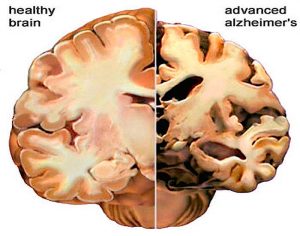What is Alzheimer’s disease?
By Marc Sorenson, EdD, Sunlight Institute
Alzheimer’s disease is a plague in our modern world. It is a progressive mental deterioration that can occur in middle or old age, due to degeneration of the brain. Alzheimer’s is also the most common cause of premature senility. The United States will see a 44 percent increase in individuals with Alzheimer’s disease by 2025.[1] First of all, the disease occurs because amyloid plaques appear in brain tissue. These plaques consist of tangles of amyloid protein (a complex protein resembling starch) in nervous tissue. They are pathological markers of the disease that are found in spaces between the brain’s nerve cells. As a result of these plaques, the brain loses its ability to function properly.
Our experience with Alzheimer’s sufferers
My wife, Vicki, and I worked with residents of an assisted-care facility for over three years. We conducted and supervised church meetings for many disabled, elderly people. Because we worked up close and personally with these residents, we understood the devastating effects of Alzheimer’s. Many of these residents could not find their way to the church meeting room without our assistance. Therefore, they obviously had the disease. Additionally, it was manifest because many of them were unable to recognize us after our being away for a day. Also, they were prone to simply get up and leave the building and be found (if lucky) wandering outside.
Does sun exposure help to reduce Alzheimer’s?
First of all, research indicates that vitamin D and omega 3 fatty acids may help in removing the aforementioned plaques.[2] Therefore, they reduce the risk or severity of AD. So, the disease may be lessened by sun exposure, since 90% of vitamin D produced in the US population is due to sun exposure.[3]
Hence, it is no surprise that the latest research paper found high risk in low-sunlight countries. Consequently, the researchers stated: “According to sunlight data, we can conclude that countries with low average sunlight have high AD (Alzheimer’s disease) death rate.[4]”
Are there other indications that sun exposure is associate to reduced risk?
Sun exposure directly correlates to non-melanoma skin cancer (NMSC). Therefore, the latter is often used as a sun-exposure indicator. It is thus compared with various diseases to evaluate the relationship between them and sun exposure. A 2013 article, published in the journal Neurology, reveals that among people with NMSC, the risk of Alzheimer’s disease (AD) is profoundly decreased:[5] Those with NMSC had a 79% reduction in disease risk. Stated another way, those without NMSC had about five times the risk of Alzheimer’s! Of course, this demonstrates the importance of sun exposure in reducing the risk, whether due to vitamin D production of from other photoproducts of the sun.
So, what is the bottom line? Be sure to obtain some unscreened, non-burning sun exposure and keep your marbles!
[1] Disease growth: U.S. will see average 44 percent increase in Alzheimer’s disease by 2025. Alzheimer’s Association 2015. https://www.alz.org/alzwa/documents/alzwa_resource_ad_fs_ad_state_growth_stats.pdf
[2] Champeau R. Vitamin D, omega-3 help clear amyloid plaques found in Alzheimer’s. UCLA Newsroom 2013.
[3] Reichrath J. The challenge resulting from positive and negative effects of sun: how much solar UV exposure is appropriate to balance between risks of vitamin D deficiency and skin cancer? Prog Biophys Mol Biol 2006;92(1):9-16
[4] Câmara AB, de Souza ID, Dalmolin RJS. Sunlight Incidence, Vitamin D Deficiency, and Alzheimer’s Disease. J Med Food. 2018 Mar 22 [Epub ahead of print].
[5] White RS, Lipton RB, Hall CB, Steinerman JR. Nonmelanoma skin cancer is associated with reduced Alzheimer disease risk. Neurology. 2013 21;80(21):1966-72.

